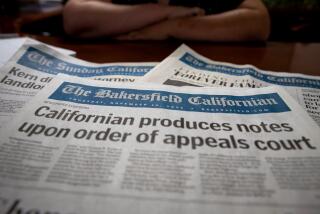Journalist Must Testify in Lindh Case, Judge Rules
ALEXANDRIA, Va. — A federal judge refused Friday to block a Southern California freelance journalist from testifying in the John Walker Lindh case, setting the stage for a critical hearing next week on whether allegedly incriminating statements Lindh gave to his captors in Afghanistan should be allowed in his upcoming trial.
Also Friday, as a preview of how contentious the weeklong hearing is likely to be, Lindh’s chief defense attorney and the judge engaged in a lengthy near-shouting match over how the defense should be allowed to present its case when the hearing begins Monday.
James J. Brosnahan said he wants to present videos and other electronic props while his witnesses are testifying, but Judge T.S. Ellis III made it clear that he wants a streamlined hearing that will end by Friday.
“We’re not going to proceed as though this is some sort of show-biz operation,” the judge warned Brosnahan.
But the San Francisco defense lawyer held his ground, arguing that he wants to do everything he can to vigorously defend Lindh, a 21-year-old from Marin County who was captured last fall fighting for the Taliban.
He told the judge that in 43 years as an attorney he had never been denied the opportunity to show evidence to his witnesses in court. Then, pointing at Lindh, he said he expected to be able to do so next week.
“There’s no show biz here, your honor,” Brosnahan said.
The dispute ended with Ellis indicating that he will decide how much of an electronic presentation is necessary as he hears testimony on whether Lindh’s statements to military and FBI interrogators should be allowed in his trial, which is set to begin Aug. 26.
Next week’s hearing is crucial because Lindh’s statements are seen as the heart of the government’s case against him, and it would be a major victory for the defense to persuade the judge to suppress them from the trial.
The defense plans to call eight to 10 witnesses to show that Lindh was physically abused, deprived of food and medical care and kept in inhumane conditions because U.S. authorities wanted to continue interrogating him.
The government said it hoped to call about a dozen witnesses, including many of Lindh’s interrogators during half a dozen sessions in the first weeks of December. But the judge told prosecutors to consider reducing the number of witnesses because he did not want to hear repetitive testimony.
One of the key witnesses for both sides is Robert Young Pelton, a freelance journalist from Redondo Beach. He conducted a brief video interview with Lindh soon after his capture in Afghanistan that was shown on CNN.
Pelton, subpoenaed by the defense to testify, asked the judge to quash the summons, arguing that it endangers him as a foreign war correspondent. He said terrorists might seek retribution against him and cited the slaying of Wall Street Journal reporter Daniel Pearl in Pakistan.
But the judge refused and said Pelton should make himself available to take the witness stand next week.
His testimony might benefit the defense case because, as a neutral observer, he presumably could testify about Lindh’s physical condition after his arrest and the way he was treated by his U.S. captors.
Also, after the video aired, Pelton was interviewed by CNN about his impressions of Lindh.
At one point, he said of Lindh: “His goal was not to fight against America. He got caught up in a war when it started shortly after Sept. 11. So I don’t think he deliberately went to fight against American interests.... At no time during my conversation with him did he give me negative opinions about America or say anything bad about our country.”
He also recalled that once U.S. Special Forces realized Lindh was an American, “one of the Green Berets guys offered to shoot him.”
Pelton could also be helpful for the government. He could testify that Lindh was never purposely tortured to get him to talk, but rather that he was kept shackled and tied to a gurney because he was a prisoner of war in a very hostile environment.
More to Read
Sign up for Essential California
The most important California stories and recommendations in your inbox every morning.
You may occasionally receive promotional content from the Los Angeles Times.











